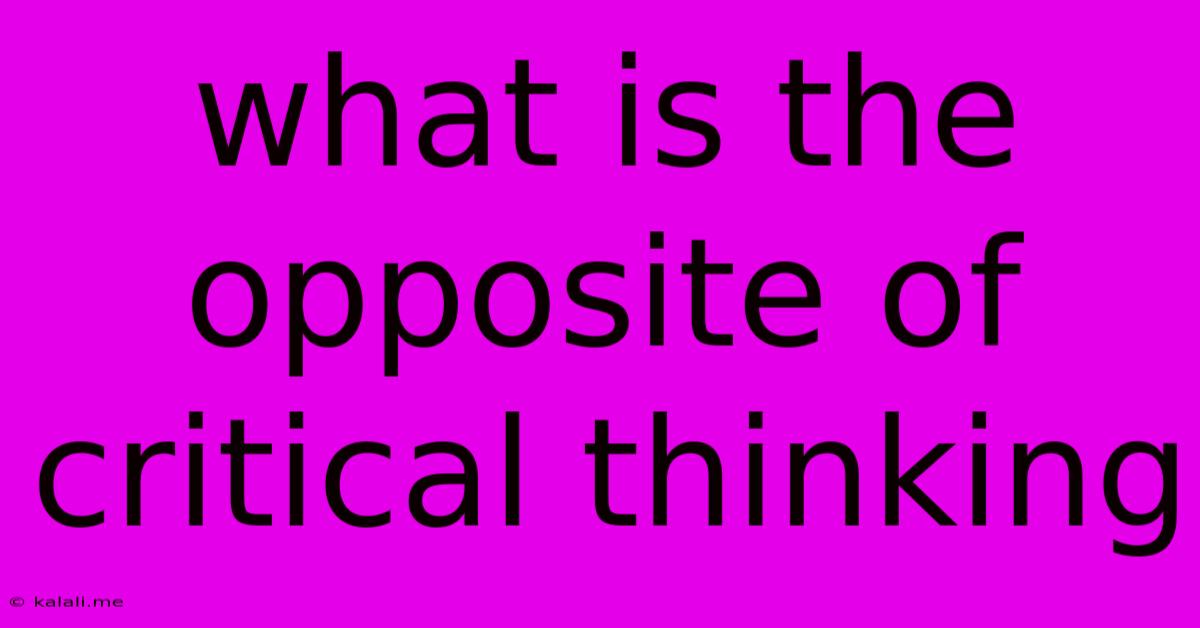What Is The Opposite Of Critical Thinking
Kalali
Jun 01, 2025 · 3 min read

Table of Contents
What is the Opposite of Critical Thinking? Unpacking Uncritical Thinking
Critical thinking, the objective analysis and evaluation of an issue in order to form a judgment, is highly valued in many fields. But what happens when we don't engage in critical thinking? What's the opposite? This isn't simply a matter of not thinking critically; it's a spectrum of behaviors and cognitive biases that can lead to flawed judgments and poor decision-making. This article delves into the various aspects of the opposite of critical thinking, exploring its manifestations and potential consequences.
The opposite of critical thinking isn't necessarily no thinking; it's uncritical thinking. This encompasses a range of cognitive tendencies and behaviors that hinder objective analysis and reasoned judgment. It's characterized by a passive acceptance of information, a lack of questioning, and a susceptibility to bias and manipulation.
Key Characteristics of Uncritical Thinking
Several traits define uncritical thinking. These include:
-
Blind Acceptance of Authority: Uncritically accepting information simply because it comes from a perceived authority figure, without questioning its validity or considering alternative perspectives. This can manifest in unquestioning obedience to superiors or blind faith in experts without examining their evidence or potential biases.
-
Confirmation Bias: Actively seeking out and interpreting information that confirms pre-existing beliefs, while ignoring or dismissing information that contradicts them. This reinforces existing biases and prevents objective evaluation.
-
Emotional Reasoning: Allowing emotions to dictate judgments and decisions, rather than relying on reason and evidence. This can lead to impulsive actions and poor choices based on feelings rather than facts.
-
Superficial Thinking: Failing to delve deeply into issues, considering only surface-level information, and neglecting to explore underlying assumptions or potential complexities. This results in oversimplified understanding and flawed conclusions.
-
Resistance to Feedback: Rejecting criticism or alternative perspectives, refusing to consider contradictory evidence, and maintaining rigid beliefs regardless of new information. This hinders personal growth and learning.
-
Cognitive Biases: Numerous cognitive biases, such as the availability heuristic (overestimating the likelihood of events easily recalled) and anchoring bias (over-relying on the first piece of information received), contribute to uncritical thinking.
The Consequences of Uncritical Thinking
The ramifications of uncritical thinking are significant and far-reaching:
-
Poor Decision-Making: Decisions based on flawed information and unchecked biases lead to suboptimal outcomes, both personally and professionally.
-
Susceptibility to Manipulation: Individuals prone to uncritical thinking are more vulnerable to propaganda, misinformation, and manipulation from others.
-
Limited Growth and Learning: A lack of self-reflection and critical evaluation hinders personal growth, intellectual development, and the acquisition of new knowledge.
-
Conflict and Misunderstanding: Uncritical acceptance of one's own perspectives can lead to conflict and misunderstanding with others holding different views.
-
Spread of Misinformation: Uncritically accepting and sharing false information contributes to the spread of misinformation and harmful narratives.
Cultivating Critical Thinking Skills
To counteract uncritical thinking, it's crucial to actively cultivate critical thinking skills. This involves:
-
Questioning Assumptions: Constantly challenging the underlying assumptions and beliefs driving your thoughts and actions.
-
Seeking Multiple Perspectives: Actively seeking out and considering different viewpoints, even those that contradict your own.
-
Evaluating Evidence: Critically assessing the credibility, validity, and reliability of information sources.
-
Identifying Biases: Recognizing and mitigating your own biases and those of others.
-
Engaging in Self-Reflection: Regularly reflecting on your thinking processes, identifying areas for improvement, and seeking feedback from others.
By understanding the characteristics and consequences of uncritical thinking, we can better equip ourselves to engage in critical thinking – a crucial skill for navigating the complexities of the modern world. The opposite of critical thinking is not simply inaction, but a pathway to flawed judgments and misguided decisions. Cultivating critical thinking skills is therefore an essential pursuit for personal and collective progress.
Latest Posts
Latest Posts
-
Why Is It Called The 3 Rs
Jun 03, 2025
-
Not Getting Fuel To The Carburetor
Jun 03, 2025
-
Can You Use Curseforge With Minecraft Relms
Jun 03, 2025
-
How Long Is Antifreeze Good For
Jun 03, 2025
-
Everything Looks Wonderful I Hope You Re Having A Great Time
Jun 03, 2025
Related Post
Thank you for visiting our website which covers about What Is The Opposite Of Critical Thinking . We hope the information provided has been useful to you. Feel free to contact us if you have any questions or need further assistance. See you next time and don't miss to bookmark.